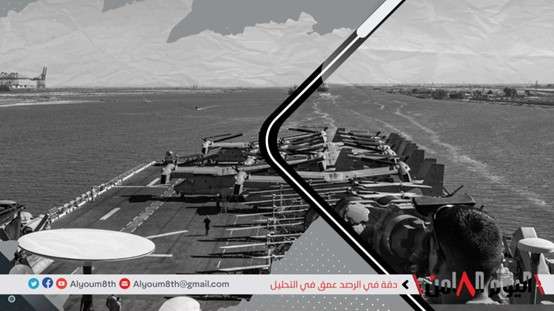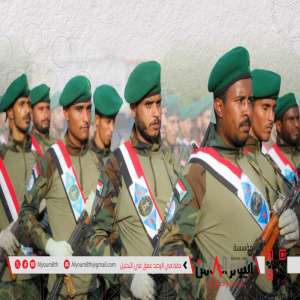"Newspaper reports speak of the strongest U.S. commitment to the region in decades."
Saudi-Iranian reconciliation and US prepare to counter IRGC activities
The Iran regime actually has limited options. Engaging in a large-scale military confrontation with the United States in the waters is not a viable path, given the risks it may entail.

U.S. Pushes Reinforcements to Red Sea - Agencies
Despite Iranian messages towards the Persian Gulf, Saudi diplomatic sources confirmed the success of the summit held by Iranian Foreign Minister Hossein Amir Abdollahian with Saudi Crown Prince Mohammed bin Salman, which culminated in the latter's welcome to an Iranian invitation to visit Tehran in the coming period.
A Yemeni source residing in Saudi Arabia told (Alyoum8th): "The visit of the Iranian Foreign Minister to Saudi Arabia comes at the heart of addressing the Yemeni crisis, in reference to the coup brought about by the Houthis, and pushing Saudi Arabia to intervene militarily to deter Iranian arms in Yemen, but the Saudis say that the visit aims to address the crisis that erupted between Riyadh and Tehran, following Saudi Arabia's execution of a Saudi dissident from the Shiite community in 2016, on charges that he is a terrorist, which prompted the Iranians to destroy the embassy. Saudi Arabia in Tehran to protest the execution of Shiite cleric Nimr al-Nimr.
The source stressed: "The Omani mediation succeeded in convincing the Houthis of a Saudi role as a mediator in the crisis alongside the Sultanate, in exchange for commitments made by Saudi Arabia to hand over salaries to Iranian arms of oil resources by 82% of the resources, provided that the Houthis disburse them to Yemeni employees in North Yemen.
On Saturday, the King Salman Relief Fund announced that it had sent a hundred relief trucks to Yemenis under the control of the Houthi militias, as a gesture of goodwill by Saudi Arabia, but it seems that the Saudi-Iranian reconciliation was not satisfied with the United States, which sent its forces to the Red Sea to deter what it called the activities of the Iranian Revolutionary Guards.
MEE – a London-based news website that covers events in the Middle East – said, "President Joe Biden's decision to send more Marines and warships to the Persian Gulf is a strategic step to counter the Iranian regime's destabilizing activities, in a strategic decision reminiscent of former President Ronald Reagan's flag-change. Iran's aggressive tactics against commercial tankers."
With oil tankers under U.S. Navy protection, Washington's message to the Iranian regime couldn't be clearer: The era of unfettered naval aggression is over, and the United States is ready to counter the Islamic Revolutionary Guard Corps' destabilizing and provocative activities. "The regime may try to force the U.S. government to change course through various limited strategies, but President Joe Biden must stand firm and respond decisively."
Washington's reinforcement plan includes sending 3,000 Marines and sailors aboard both the amphibious assault ship USS Patan and the landing ship USS Carter Hall. Such a plan would likely entail changing the flag of tankers in the Persian Gulf, meaning that oil tankers would fly the U.S. flag, using the U.S. Navy's Protective Service.
The deployment of amphibious landing ships, capable of transporting and deploying troops, equipment and vehicles directly to the coast, underscores a decisive signal: U.S. forces are ready, if necessary, to make an intervention ashore. The Reagan administration used this strategy in 1987 to draw Arab states in the region into open and explicit military alliances with Washington against the Islamic Republic.
Washington's strategic shift has surprised the Iranian regime, because such a level of U.S. commitment in the region has not been seen since the Reagan era.
In addition, regime leaders have long viewed the Biden administration as weak and have not appreciated Biden, whom they routinely describe as "indecisive."
Given this perception of weakness, the IRGC navy has emboldened to engage in a series of confrontations, attacking or seizing 20 commercial tankers in the region since Biden took office. For example, in 2021, the IRGC-affiliated navy orchestrated a deadly attack on an oil tanker off the coast of Oman.
In July 2023, the IRGC navy opened fire on two oil tankers sailing in the strategic Strait of Hormuz, a pivotal passage through which one-fifth of the world's crude oil passes, and tried to seize it.
The incident occurred after the U.S. Department of Justice ordered the seizure of a Marshall Islands-flagged tanker carrying Iranian fuel to China in April. Moreover, in the video "Humiliation of American Sailors by IRGC," published by the Islamic Republic News Agency on May 1, 2023, the IRGC Navy is seen giving an order to the U.S. warship to "speak Farsi" as it transits Gulf waters. "This is the Persian Gulf. Speak Persian. Did you hear me?" Iran's Revolutionary Guard Marine Corps can be heard in the video.
Moreover, IRGC officials have repeatedly threatened to close the Strait of Hormuz, which would disrupt regional crude oil shipments. Other regime officials have often claimed that closing the strait would be "as easy as drinking a glass of water."
The potential disruption of crude oil shipments through the strategic waterway will have a significant negative impact on the global economy.
An enhanced U.S. military presence in the Persian Gulf will likely reduce the IRGC's aggressive activities in the region, but this is no guarantee that the regime will halt all provocations or refrain from further action.
Brigadier General Ramadan Sharif, spokesman for Iran's Islamic Revolutionary Guard Corps (IRGC), issued a statement indicating his readiness to intensify confrontations. Speaking to the IRGC-linked Fars News Agency, he said they were ready to seize U.S. ships in the waters. As he put it, "the Islamic Republic has the ability to respond to any harm by the Americans, including seizing their ships in retaliation."
"The Islamic Republic has the ability to respond to any harm by the Americans, including seizing their ships in response."
Showcasing its burgeoning capabilities, IRGC-affiliated media also announced that the military organization had acquired supersonic cruise missile technology, capable of evading radars and penetrating any defense system.
Iran's Islamic Revolutionary Guard Corps (IRGC) has also conducted two military exercises aimed at showcasing its combat preparations "to defend Iran's islands and ensure the security of the Persian Gulf".
During one of the exercises, dubbed "Martyr Ishaq Dara," Hossein Salami, commander-in-chief of the IRGC, noted that his organization is determined to defend Iran's territorial integrity anywhere on land and sea.
While this shows their readiness, the regime actually has limited options. Engaging in a large-scale military confrontation with the United States in the waters is not a viable path, given the risks it may entail. However, the regime can still choose low-scale measures to force the U.S. government to change course.
One possible option for the regime is to step up efforts to take more American citizens hostage, a strategy it has used over the past four decades. The theocratic regime began its hostage-taking strategy in November 1979 by capturing 52 U.S. diplomats and holding them for 444 days. In subsequent years, the Islamic Revolutionary Guard Corps Intelligence Organization arrested several foreigners and dual nationals, including U.S. citizens.
Currently, five U.S. citizens are being held hostage by the Islamic Revolutionary Guard Corps (IRGC). The last arrests occurred in July 2023, when the regime arrested and detained a U.S. citizen. Then, in August, special forces arrested another Iranian-US citizen, a woman known for her work in NGOs in Afghanistan. Although the U.S. government reached an agreement with the regime to release the five imprisoned Americans for $6 billion, the regime is expected to take more Americans hostage.
The second possible option is likely to retaliate against Saudi Arabia for its alleged role in persuading the U.S. government to increase its military presence in the region.
Iran's Islamic Revolutionary Guard Corps (IRGC) National Armed Forces have indirectly blamed Saudi Arabia for the U.S. military buildup in Persian Gulf waters. According to the newspaper, Fayez bin Hamid al-Waeli, chairman of the Joint Chiefs of Staff of the Saudi military, recently met with Admiral Brad Cooper, commander of the U.S. Navy's Fifth Fleet, in Riyadh. During the meeting, they reviewed bilateral cooperation with regard to the security of sea and waterways. In addition, they explored ways to enhance military cooperation.
Alireza Tangsiri, commander of the IRGC Navy, indirectly warned Saudi Arabia when he warned that "countries in the region" must be very vigilant and vigilant against the evil plots and plans of the United States and the Zionist regime.
A major attack, similar to the 2019 drone and missile strikes on two Saudi oil facilities that shut down half of Saudi oil production, may not be imminent at this point. This is especially true given that the two countries have recently resumed diplomatic relations. However, symbolic attacks in the form of sabotage or cyberattacks should not be completely ruled out.
Finally, the IRGC may try to lay mines in the Strait of Hormuz, a choke point of global significance. IRGC officials have previously stated that "if Iran cannot export its oil, no one else will be able to export its oil."
This will not be the first time the IRGC has carried out such a devastating operation. On July 24, 1987, just three days after Reagan began Operation Flag Restoration known as Operation Serious Will, the IRGC laid mines near the Strait of Hormuz. One of these mines exploded, damaging a Kuwaiti tanker whose flag had been raised. This mine would have been powerful enough to sink one of the American frigates, had it hit the frigate instead of the tanker.
President Biden's decision to send more Marines and warships to the Persian Gulf is a strategic step to counter the Iranian regime's destabilizing activities. Such a plan requires a strong commitment to respond to any attacks on merchant ships in the waters of the Persian Gulf. If the United States fails to respond decisively, the regime may view it as weak and indecisive.



